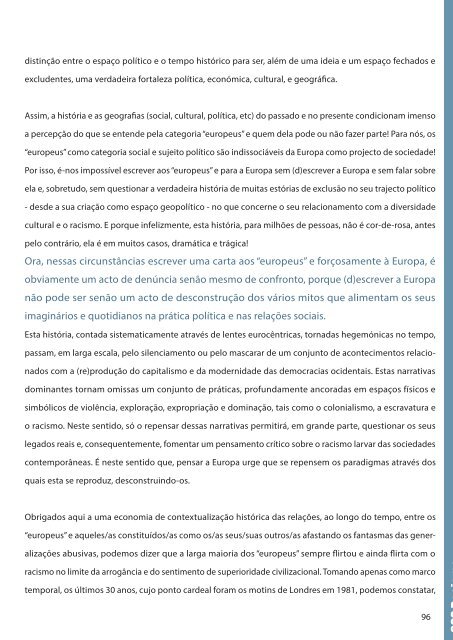cartas a @ s europe @ s cartas al europe letterstotheeuropeans
cartas a @ s europe @ s cartas al europe letterstotheeuropeans
cartas a @ s europe @ s cartas al europe letterstotheeuropeans
You also want an ePaper? Increase the reach of your titles
YUMPU automatically turns print PDFs into web optimized ePapers that Google loves.
distinção entre o espaço político e o tempo histórico para ser, <strong>al</strong>ém de uma ideia e um espaço fechados e<br />
excludentes, uma verdadeira fort<strong>al</strong>eza política, económica, cultur<strong>al</strong>, e geográfica.<br />
Assim, a história e as geografias (soci<strong>al</strong>, cultur<strong>al</strong>, política, etc) do passado e no presente condicionam imenso<br />
a percepção do que se entende pela categoria “<strong>europe</strong>us” e quem dela pode ou não fazer parte! Para nós, os<br />
“<strong>europe</strong>us” como categoria soci<strong>al</strong> e sujeito político são indissociáveis da Europa como projecto de sociedade!<br />
Por isso, é-nos impossível escrever aos “<strong>europe</strong>us” e para a Europa sem (d)escrever a Europa e sem f<strong>al</strong>ar sobre<br />
ela e, sobretudo, sem questionar a verdadeira história de muitas estórias de exclusão no seu trajecto político<br />
- desde a sua criação como espaço geopolítico - no que concerne o seu relacionamento com a diversidade<br />
cultur<strong>al</strong> e o racismo. E porque infelizmente, esta história, para milhões de pessoas, não é cor-de-rosa, antes<br />
pelo contrário, ela é em muitos casos, dramática e trágica!<br />
Ora, nessas circunstâncias escrever uma carta aos “<strong>europe</strong>us” e forçosamente à Europa, é<br />
obviamente um acto de denúncia senão mesmo de confronto, porque (d)escrever a Europa<br />
não pode ser senão um acto de desconstrução dos vários mitos que <strong>al</strong>imentam os seus<br />
imaginários e quotidianos na prática política e nas relações sociais.<br />
Esta história, contada sistematicamente através de lentes eurocêntricas, tornadas hegemónicas no tempo,<br />
passam, em larga esc<strong>al</strong>a, pelo silenciamento ou pelo mascarar de um conjunto de acontecimentos relacio-<br />
nados com a (re)produção do capit<strong>al</strong>ismo e da modernidade das democracias ocidentais. Estas narrativas<br />
dominantes tornam omissas um conjunto de práticas, profundamente ancoradas em espaços físicos e<br />
simbólicos de violência, exploração, expropriação e dominação, tais como o coloni<strong>al</strong>ismo, a escravatura e<br />
o racismo. Neste sentido, só o repensar dessas narrativas permitirá, em grande parte, questionar os seus<br />
legados reais e, consequentemente, fomentar um pensamento crítico sobre o racismo larvar das sociedades<br />
contemporâneas. É neste sentido que, pensar a Europa urge que se repensem os paradigmas através dos<br />
quais esta se reproduz, desconstruindo-os.<br />
Obrigados aqui a uma economia de contextu<strong>al</strong>ização histórica das relações, ao longo do tempo, entre os<br />
“<strong>europe</strong>us” e aqueles/as constituídos/as como os/as seus/suas outros/as afastando os fantasmas das gener-<br />
<strong>al</strong>izações abusivas, podemos dizer que a larga maioria dos “<strong>europe</strong>us” sempre flirtou e ainda flirta com o<br />
racismo no limite da arrogância e do sentimento de superioridade civilizacion<strong>al</strong>. Tomando apenas como marco<br />
tempor<strong>al</strong>, os últimos 30 anos, cujo ponto carde<strong>al</strong> foram os motins de Londres em 1981, podemos constatar,<br />
96<br />
SOS Racismo<br />
space and a period in history to become, in addition to a closed, excluding idea and space, an authentic<br />
politic<strong>al</strong>, economic, cultur<strong>al</strong> and geographic<strong>al</strong> fortress.<br />
Therefore the history and geographies (soci<strong>al</strong>, cultur<strong>al</strong>, politic<strong>al</strong>, etc) of the past and the present greatly influ-<br />
ence the perception of what is understood by the category “<strong>europe</strong>ans” and who can, or cannot, be part of<br />
it! For us, “<strong>europe</strong>ans” as a soci<strong>al</strong> category and politic<strong>al</strong> subject is inseparable from Europe as a soci<strong>al</strong> project!<br />
So, it is impossible for us to write to “<strong>europe</strong>ans” and to Europe without (de)scribing Europe and t<strong>al</strong>king about<br />
it and, above <strong>al</strong>l, without questioning the true history of the many stories of exclusion that are part of its<br />
politic<strong>al</strong> trajectory – since its creation as a geopolitic<strong>al</strong> space – in its relationship with cultur<strong>al</strong> diversity and<br />
racism. Unfortunately, for thousands of people, this history is not a happy one – on the contrary, in many<br />
cases it is dramatic and tragic!<br />
In these circumstances writing a letter to “<strong>europe</strong>ans”, and therefore to Europe, is obviously an<br />
act of denunciation, if not actu<strong>al</strong> confrontation, since (de)scribing Europe cannot be anything<br />
other than an act of deconstructing the various myths that fuel its imaginaries and everyday<br />
experience in politic<strong>al</strong> practices and soci<strong>al</strong> relations.<br />
This history, systematic<strong>al</strong>ly recounted from a Eurocentric perspective that has become hegemonic over<br />
time, includes the silencing or masking on a large sc<strong>al</strong>e of a series of events relating to the (re)production of<br />
capit<strong>al</strong>ism and the modernity of western democracies. These dominant narratives omit a series of practices<br />
that are deeply rooted in physic<strong>al</strong> spaces and are symbolic of violence, exploitation, expropriation and<br />
domination, such as coloni<strong>al</strong>ism, slavery and racism. Thus it is only, to a large extent, by rethinking these<br />
narratives that it becomes possible to question their re<strong>al</strong> legacies and consequently foster critic<strong>al</strong> thinking<br />
about the nascent racism of contemporary societies. In this sense, thinking about Europe demands rethinking<br />
the paradigms through which it is reproduced, deconstructing them.<br />
Restricted here to a brief historic<strong>al</strong> contextu<strong>al</strong>isation of the relations, over time, between “<strong>europe</strong>ans” and<br />
those established as their “Others” and avoiding abusive gener<strong>al</strong>isations, it may be said that the great majority<br />
of “<strong>europe</strong>ans” has <strong>al</strong>ways flirted with racism within the limits of arrogance and feeling of civilisation<strong>al</strong> superi-<br />
ority, and still does. Taking only the last 30 years as a time reference, in which the London riots of 1981 are<br />
the main reference, it may be said, unfortunately in many cases with the acquiescence of “<strong>europe</strong>ans”, that<br />
97


